四级听力短文部分(改革)
- 格式:doc
- 大小:40.50 KB
- 文档页数:8
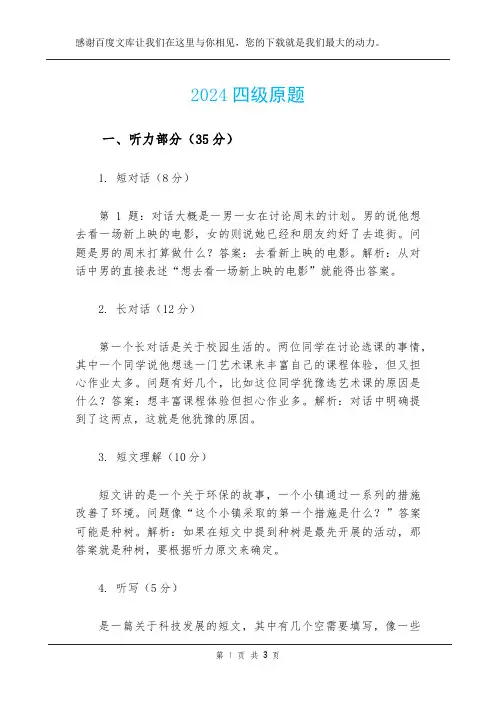
2024四级原题一、听力部分(35分)1. 短对话(8分)第1题:对话大概是一男一女在讨论周末的计划。
男的说他想去看一场新上映的电影,女的则说她已经和朋友约好了去逛街。
问题是男的周末打算做什么?答案:去看新上映的电影。
解析:从对话中男的直接表述“想去看一场新上映的电影”就能得出答案。
2. 长对话(12分)第一个长对话是关于校园生活的。
两位同学在讨论选课的事情,其中一个同学说他想选一门艺术课来丰富自己的课程体验,但又担心作业太多。
问题有好几个,比如这位同学犹豫选艺术课的原因是什么?答案:想丰富课程体验但担心作业多。
解析:对话中明确提到了这两点,这就是他犹豫的原因。
3. 短文理解(10分)短文讲的是一个关于环保的故事,一个小镇通过一系列的措施改善了环境。
问题像“这个小镇采取的第一个措施是什么?”答案可能是种树。
解析:如果在短文中提到种树是最先开展的活动,那答案就是种树,要根据听力原文来确定。
4. 听写(5分)是一篇关于科技发展的短文,其中有几个空需要填写,像一些专业术语或者关键的动词等。
比如“人工智能在医疗领域的(应用)”,答案是“应用”。
解析:要根据对短文的理解以及语法等知识来确定填写的内容。
二、阅读部分(35分)1. 词汇理解(10分)给出一篇文章,有10个空,下面给出15个备选单词。
例如文章大概是讲文化交流的,其中有个空是“这种文化(现象)引起了广泛的关注”,答案可能是“phenomenon”。
解析:要根据文章的语境、语法结构以及单词的含义来选择正确的单词。
2. 长篇阅读(10分)会有两篇较长的文章,后面有10个句子需要和文章中的段落进行匹配。
比如文章A是关于历史文化遗产保护的,文章B是关于现代城市建设的。
其中一个句子“与古老建筑保护相关的内容”可能就和文章A匹配。
答案:文章A。
解析:通过阅读句子和两篇文章的内容,找到最相关的那篇文章。
3. 仔细阅读(15分)有两篇短文,每篇短文后面有几个问题。
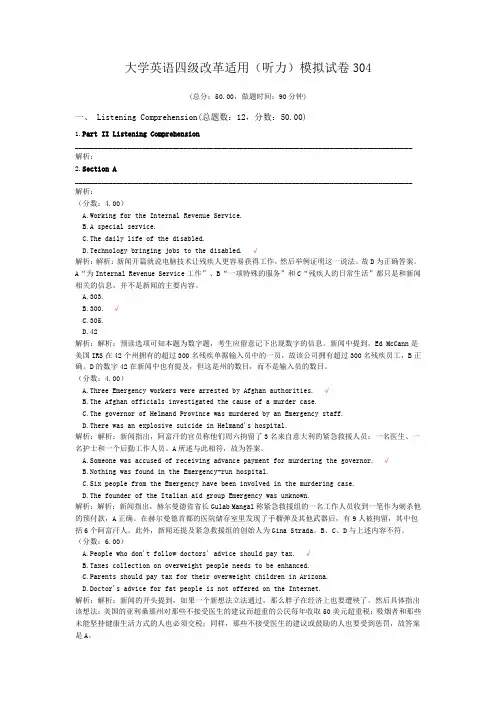
大学英语四级改革适用(听力)模拟试卷304(总分:50.00,做题时间:90分钟)一、 Listening Comprehension(总题数:12,分数:50.00)1.Part II Listening Comprehension__________________________________________________________________________________________ 解析:2.Section A__________________________________________________________________________________________ 解析:(分数:4.00)A.Working for the Internal Revenue Service.B.A special service.C.The daily life of the disabled.D.Technology bringing jobs to the disabled. √解析:解析:新闻开篇就说电脑技术让残疾人更容易获得工作,然后举例证明这一说法。
故D为正确答案。
A“为Internal Revenue Service工作”、B“一项特殊的服务”和C“残疾人的日常生活”都只是和新闻相关的信息,并不是新闻的主要内容。
A.303.B.300. √C.305.D.42解析:解析:预读选项可知本题为数字题,考生应留意记下出现数字的信息。
新闻中提到,Ed McCann是美国IRS在42个州拥有的超过300名残疾单据输入员中的一员,故该公司拥有超过300名残疾员工,B正确。
D的数字42在新闻中也有提及,但这是州的数目,而不是输入员的数目。
(分数:4.00)A.Three Emergency workers were arrested by Afghan authorities. √B.The Afghan officials investigated the cause of a murder case.C.The governor of Helmand Province was murdered by an Emergency staff.D.There was an explosive suicide in Helmand's hospital.解析:解析:新闻指出,阿富汗的官员称他们周六拘留了3名来自意大利的紧急救援人员:一名医生、一名护士和一个后勤工作人员。
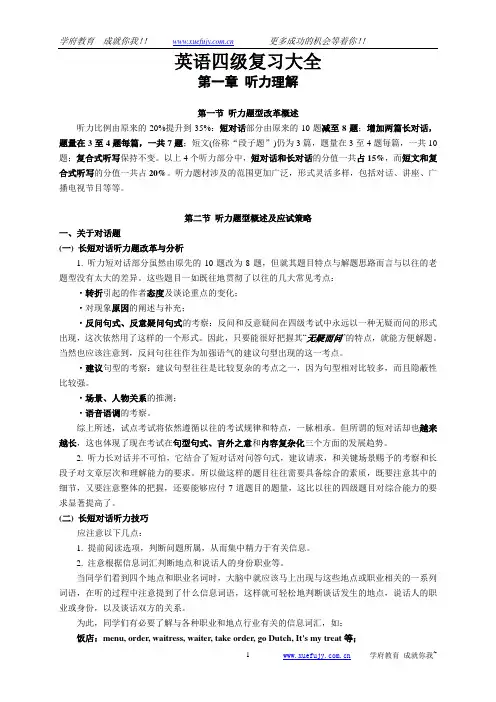
英语四级复习大全第一章听力理解第一节听力题型改革概述听力比例由原来的20%提升到35%:短对话部分由原来的10题减至8题;增加两篇长对话,题量在3至4题每篇,一共7题;短文(俗称“段子题”)仍为3篇,题量在3至4题每篇,一共10题;复合式听写保持不变。
以上4个听力部分中,短对话和长对话的分值一共占15%,而短文和复合式听写的分值一共占20%。
听力题材涉及的范围更加广泛,形式灵活多样,包括对话、讲座、广播电视节目等等。
第二节听力题型概述及应试策略一、关于对话题(一) 长短对话听力题改革与分析1. 听力短对话部分虽然由原先的10题改为8题,但就其题目特点与解题思路而言与以往的老题型没有太大的差异。
这些题目一如既往地贯彻了以往的几大常见考点:·转折引起的作者态度及谈论重点的变化;·对现象原因的阐述与补充;·反问句式、反意疑问句式的考察:反问和反意疑问在四级考试中永远以一种无疑而问的形式出现,这次依然用了这样的一个形式。
因此,只要能很好把握其“无疑而问”的特点,就能方便解题。
当然也应该注意到,反问句往往作为加强语气的建议句型出现的这一考点。
·建议句型的考察:建议句型往往是比较复杂的考点之一,因为句型相对比较多,而且隐蔽性比较强。
·场景、人物关系的推测;·语音语调的考察。
综上所述,试点考试将依然遵循以往的考试规律和特点,一脉相承。
但所谓的短对话却也越来越长,这也体现了现在考试在句型句式、言外之意和内容复杂化三个方面的发展趋势。
2. 听力长对话并不可怕,它结合了短对话对问答句式,建议请求,和关键场景赐予的考察和长段子对文章层次和理解能力的要求。
所以做这样的题目往往需要具备综合的素质,既要注意其中的细节,又要注意整体的把握,还要能够应付7道题目的题量,这比以往的四级题目对综合能力的要求显著提高了。
(二) 长短对话听力技巧应注意以下几点:1. 提前阅读选项,判断问题所属,从而集中精力于有关信息。
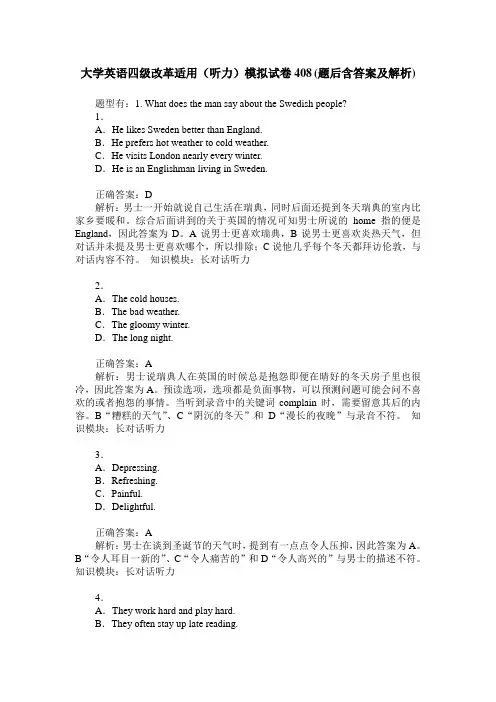
大学英语四级改革适用(听力)模拟试卷408(题后含答案及解析)题型有:1. What does the man say about the Swedish people?1.A.He likes Sweden better than England.B.He prefers hot weather to cold weather.C.He visits London nearly every winter.D.He is an Englishman living in Sweden.正确答案:D解析:男士一开始就说自己生活在瑞典,同时后面还提到冬天瑞典的室内比家乡要暖和。
综合后面讲到的关于英国的情况可知男士所说的home指的便是England,因此答案为D。
A说男士更喜欢瑞典,B说男士更喜欢炎热天气,但对话并未提及男士更喜欢哪个,所以排除;C说他几乎每个冬天都拜访伦敦,与对话内容不符。
知识模块:长对话听力2.A.The cold houses.B.The bad weather.C.The gloomy winter.D.The long night.正确答案:A解析:男士说瑞典人在英国的时候总是抱怨即便在晴好的冬天房子里也很冷,因此答案为A。
预读选项,选项都是负面事物,可以预测问题可能会问不喜欢的或者抱怨的事情。
当听到录音中的关键词complain时,需要留意其后的内容。
B“糟糕的天气”、C“阴沉的冬天”和D“漫长的夜晚”与录音不符。
知识模块:长对话听力3.A.Depressing.B.Refreshing.C.Painful.D.Delightful.正确答案:A解析:男士在谈到圣诞节的天气时,提到有一点点令人压抑,因此答案为A。
B“令人耳目一新的”、C“令人痛苦的”和D“令人高兴的”与男士的描述不符。
知识模块:长对话听力4.A.They work hard and play hard.B.They often stay up late reading.C.They like to go camping in summer.D.They try to earn more and spend more.正确答案:A解析:男士提到,在夏季的时候,瑞典人喜欢努力工作,但是也会拼命玩乐,因此答案为A。

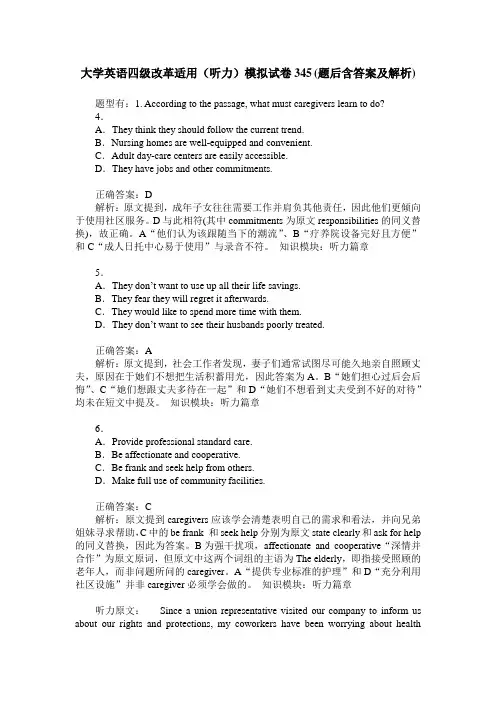
大学英语四级改革适用(听力)模拟试卷345(题后含答案及解析)题型有:1. According to the passage, what must caregivers learn to do?4.A.They think they should follow the current trend.B.Nursing homes are well-equipped and convenient.C.Adult day-care centers are easily accessible.D.They have jobs and other commitments.正确答案:D解析:原文提到,成年子女往往需要工作并肩负其他责任,因此他们更倾向于使用社区服务。
D与此相符(其中commitments为原文responsibilities的同义替换),故正确。
A“他们认为该跟随当下的潮流”、B“疗养院设备完好且方便”和C“成人日托中心易于使用”与录音不符。
知识模块:听力篇章5.A.They don’t want to use up all their life savings.B.They fear they will regret it afterwards.C.They would like to spend more time with them.D.They don’t want to see their husbands poorly treated.正确答案:A解析:原文提到,社会工作者发现,妻子们通常试图尽可能久地亲自照顾丈夫,原因在于她们不想把生活积蓄用光,因此答案为A。
B“她们担心过后会后悔”、C“她们想跟丈夫多待在一起”和D“她们不想看到丈夫受到不好的对待”均未在短文中提及。
知识模块:听力篇章6.A.Provide professional standard care.B.Be affectionate and cooperative.C.Be frank and seek help from others.D.Make full use of community facilities.正确答案:C解析:原文提到caregivers应该学会清楚表明自己的需求和看法,并向兄弟姐妹寻求帮助,C中的be frank 和seek help分别为原文state clearly和ask for help 的同义替换,因此为答案。
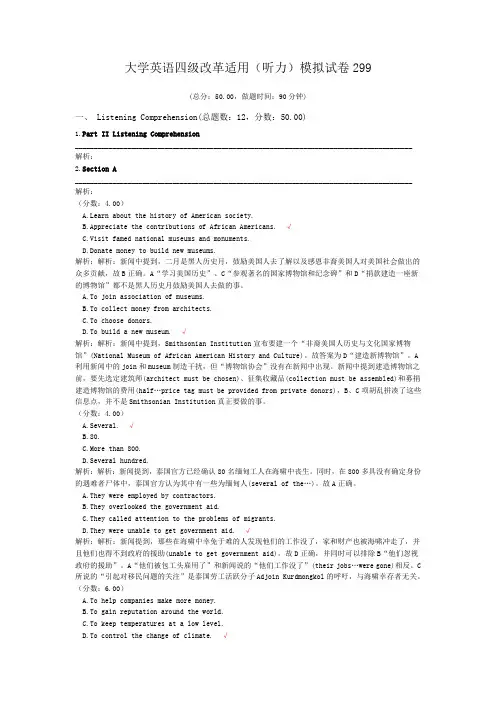
大学英语四级改革适用(听力)模拟试卷299(总分:50.00,做题时间:90分钟)一、 Listening Comprehension(总题数:12,分数:50.00)1.Part II Listening Comprehension__________________________________________________________________________________________ 解析:2.Section A__________________________________________________________________________________________ 解析:(分数:4.00)A.Learn about the history of American society.B.Appreciate the contributions of African Americans. √C.Visit famed national museums and monuments.D.Donate money to build new museums.解析:解析:新闻中提到,二月是黑人历史月,鼓励美国人去了解以及感恩非裔美国人对美国社会做出的众多贡献,故B正确。
A“学习美国历史”、C“参观著名的国家博物馆和纪念碑”和D“捐款建造一座新的博物馆”都不是黑人历史月鼓励美国人去做的事。
A.To join association of museums.B.To collect money from architects.C.To choose donors.D.To build a new museum. √解析:解析:新闻中提到,Smithsonian Institution宣布要建一个“非裔美国人历史与文化国家博物馆”(National Museum of African American History and Culture)。
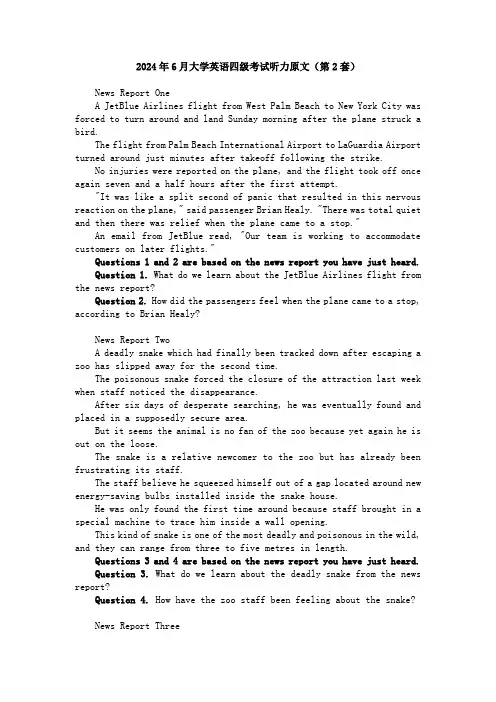
2024年6月大学英语四级考试听力原文(第2套)News Report OneA JetBlue Airlines flight from West Palm Beach to New York City was forced to turn around and land Sunday morning after the plane struck a bird.The flight from Palm Beach International Airport to LaGuardia Airport turned around just minutes after takeoff following the strike.No injuries were reported on the plane, and the flight took off once again seven and a half hours after the first attempt."It was like a split second of panic that resulted in this nervous reaction on the plane," said passenger Brian Healy. "There was total quiet and then there was relief when the plane came to a stop."An email from JetBlue read, "Our team is working to accommodate customers on later flights."Questions 1 and 2 are based on the news report you have just heard.Question 1. What do we learn about the JetBlue Airlines flight from the news report?Question 2.How did the passengers feel when the plane came to a stop, according to Brian Healy?News Report TwoA deadly snake which had finally been tracked down after escaping a zoo has slipped away for the second time.The poisonous snake forced the closure of the attraction last week when staff noticed the disappearance.After six days of desperate searching, he was eventually found and placed in a supposedly secure area.But it seems the animal is no fan of the zoo because yet again he is out on the loose.The snake is a relative newcomer to the zoo but has already been frustrating its staff.The staff believe he squeezed himself out of a gap located around new energy-saving bulbs installed inside the snake house.He was only found the first time around because staff brought in a special machine to trace him inside a wall opening.This kind of snake is one of the most deadly and poisonous in the wild, and they can range from three to five metres in length.Questions 3 and 4 are based on the news report you have just heard.Question 3. What do we learn about the deadly snake from the news report?Question 4. How have the zoo staff been feeling about the snake?News Report ThreeElectric bikes have been the craze in downtown Jacksonville since they were first introduced earlier this month as a one-year pilot program.But they're leading to safety concerns, mainly at night when some riders don't follow the rules of the road.As the night goes on, groups of riders are often seen traveling in just about every direction in the streets and on pedestrian paths.That is increasing the probability of dangerous accidents.Electric bike riders have to follow all the same rules as you would if you were in an automobile.That means no running red lights or traveling in the opposite direction of traffic on one-way streets.City Council member Anna Cumber was instrumental in introducing the electric bikes to Jacksonville as a way to bring new life into downtown. And she's aware of the concerns.Cumber said, "People can have fun, but both drivers and riders are responsible for paying attention while on the road. And never assume the driver is going to stop or see you."Questions 5 to 7 are based on the news report you have just heard.Question 5.What do we learn from the news report about the introduction of electric bikes into Jacksonville?Question 6. What are electric bike riders supposed to do?Question 7. Why did City Council member Anna Cumber advocate the introduction of electric bikes into Jacksonville?Conversation OneWhat's the best way to teach children how to save and spend their money?You should make money a regular topic of discussion. It's best to start young. So it's instinctive rather than a scary subject.In our family, we talk openly about things like the budget for holidays, how taxes reduce your income, and how to shop around for the best deals.Indeed. It's also essential to make money real for children through practical examples.Working out how much we save using discount pizza coupons, for example, is much more relevant than abstract sums.We also give our kids pocket money, and the amount they get is linked to chores, such as putting the bins out and emptying the dishwasher.We do that, too. And it's paid according to their age, £2 for each year. So they can see some progression.Teaching them to save is important. We opened the savings account when they were young.After birthdays and Christmas, they would go to the branch and deposit their gift money.Oh, I hadn't considered doing that. In our house, we have transparentmoney boxes for them to put small change in. So they can see their savings grow.When the time is right, I'll start talking to our children about investing and show them how the money saved for their further education has grown.I am always talking to my elder daughter about the importance of saving into a pension.She's just started a part-time job and was thinking of not contributing to her pension. Luckily, I managed to persuade her otherwise.Yes, it's such an important lesson to learn.Questions 8 to 11 are based on the conversation you have just heard.Question 8. What should we do with the topic of money according to the woman?Question 9.How does the woman say money can be made real for children?Question 10.What is the common practice between the man and the woman?Question 11. What is the woman always talking about to her elder daughter?Conversation TwoWelcome to Books in Review. Our guest today is John Banks, the author of the bestselling new book. Glad to be here, Jane.Your book has sold 2,000,000 copies. But before we discuss why it's getting so much attention, let's talk about your background.You're an economist and spent two decades teaching at universities?I spent 25 years as a professor actually, and then for the last 10 years, I've worked as a political consultant, advising politicians at the national level about problems in our country.You discuss three of those problems in the book, improving public education, reducing our nation's health care burden, and increasing personal savings.But your ideas about education are the most controversial.Absolutely. A lot of people think I'm trying to punish students who aren't doing well, when actually my goal is to give all students more incentive to succeed.I'm not sure I agree with you. Your proposal to pay cash rewards to students who get good grades is a particular problem.What about students who don't get good grades? It seems like you're blaming them for not succeeding when poor performance in school isn't the child's fault.But my proposal is not just to reward students with good grades, but also students who show improvement.Okay. Another criticism of the plan is the cash rewards themselves. Where will the money come from?If students do better, we'll spend less on schooling. So in the end,the rewards will pay for themselves.What about now? How will we fund the rewards in the meantime?Well, by increasing taxes or moving money from other areas of the budget into education.Questions 12 to 15 are based on the conversation you have just heard.Question 12. What do we learn about the man?Question 13. What does the woman say is the most controversial?Question 14. What does the man say is his real goal?Question 15.What will be one option for funding the proposed rewards according to the man?Passage OneI met three different people today, and each time, when I asked, "How are you?" The reply was exactly the same, "I'm busy".Honestly, I hear the same answer from the vast majority of people I meet. So I started to think: "Guess what? Everybody's busy!"I'm busy, you're busy, everybody's busy. So you being busy doesn't make me sympathetic at all. Because "busy" is the state of the world.So I'm launching a campaign to stop people complaining about being "busy". It may sound harsh, but the truth is, nobody cares.In a busy world, "being busy" doesn't stand out, nor does it mean productive, creative, accomplished, or professional.Steve Maraboli once said, "When someone tells you they are too busy... It's not a reflection of their schedule; it's a reflection of YOUR spot on their schedule."Donna Lynn Hope has also remarked, "Busy doesn't mean better. I've never envied a busy person—the one who likes to point out their busy lives to others."The reality is, nobody's too busy—It's just about priorities. So the next time someone asks you how you are, maybe respond differently.In my experience, the "I'm busy" response is really covering up the fact that they're not actually accomplishing their real purpose.And "being busy" is the lie they tell themselves about why they can't achieve it.Questions 16 to 18 are based on the passage you have just heard.Question 16. Why is the speaker launching a campaign?Question 17. What does the speaker advise us to do next time someone asks us how we are?Question 18.Why do many people make the "I'm busy" response, according to the speaker?Passage TwoMore and more people are taking up extreme sports like snowboarding, skateboarding, mountain biking, and many more. Why are these sportsbecoming so popular?One thing that extreme sports do better than perhaps anything else is to help you stop being afraid.It may sound strange to say that their main function is to induce fear, but after a time, your fear response to other things in life will be dramatically reduced.After all, if you can jump out of a plane or off a bridge, then you can face anything else easily. When doing extreme sports, you have to become more focused.You'll be pushed to your limits. And if you aren't focused, you'll make dangerous mistakes.Learning to be this focused when enjoying extreme sports will help you to be focused at work, keeping you more productive and ultimately more successful.It's great to stay fit and healthy, but standard exercise routines and sports only work the same muscles repeatedly.With extreme sports, you'll be working entirely different muscles, and that means you get an all-over workout.Extreme sports also burn a lot more calories than other sports. Skateboarding, for example, can burn as many as 500 calories per hour. Basketball burns around 300 in the same time.When you find that you can overcome the physical or mental challenges involved in extreme sports, you'll feel superhuman and your self-confidence will be at an all-time high.Questions 19 to 21 are based on the passage you have just heard.Question 19. What may sound strange to say about extreme sports?Question 20. Why should one be highly focused when doing extreme sports?Question 21. How can extreme sports benefit us more than standard exercise routines and sports?Passage ThreeMost of us have been in teams or organizations where we've had conflict with the people that we're working with around the ideas or decisions that we're discussing.Conflict is natural. We all bring different life and work experiences to the table. We all have different personality preferences and tendencies.We're not all going to have the same ideas on how to approach policies, programs, or problems.But too often we get caught in this place where conflict is perceived to be negative — something we want to avoid so that we can maintain the harmony of our workplace.This could be because some people want to avoid conflict at all costs,after all they still have to work together. But this kind of artificial harmony isn't the answer.Productive conflict is a vital part of teams and organizations that want to push forward and do more.Without conflict, we're often stuck in this artificial harmony where people don't express potentially innovative ideas for fear that they may start conflict with others.But if you're in a place where you have a basis of trust, conflict can be extremely productive. It can lead to increased innovation and greater trust on teams.It may be an uncomfortable process, but good leaders and healthy teams recognize that productive and healthy conflict is an important part of how they function.Questions 22 to 25 are based on the passage you have just heard.Question 22.What does the passage say about conflict in organizations?Question 23. Why do some people want to avoid conflict at all costs?Question 24.Why is productive conflict important for teams and organizations?Question 25. What does productive conflict need as a basis?。
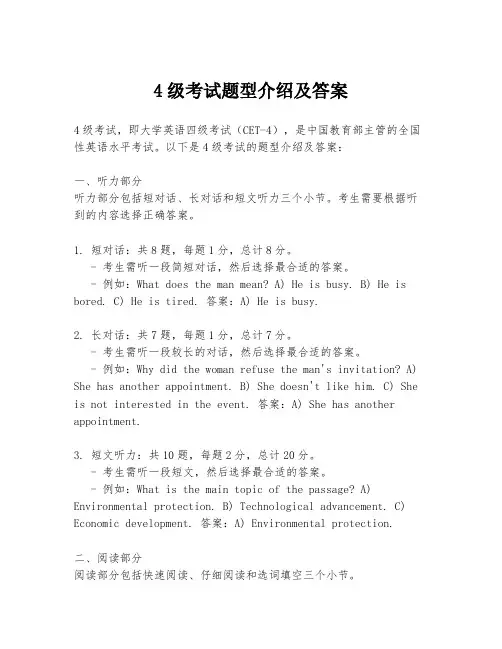
4级考试题型介绍及答案4级考试,即大学英语四级考试(CET-4),是中国教育部主管的全国性英语水平考试。
以下是4级考试的题型介绍及答案:一、听力部分听力部分包括短对话、长对话和短文听力三个小节。
考生需要根据听到的内容选择正确答案。
1. 短对话:共8题,每题1分,总计8分。
- 考生需听一段简短对话,然后选择最合适的答案。
- 例如:What does the man mean? A) He is busy. B) He is bored. C) He is tired. 答案:A) He is busy.2. 长对话:共7题,每题1分,总计7分。
- 考生需听一段较长的对话,然后选择最合适的答案。
- 例如:Why did the woman refuse the man's invitation? A) She has another appointment. B) She doesn't like him. C) She is not interested in the event. 答案:A) She has another appointment.3. 短文听力:共10题,每题2分,总计20分。
- 考生需听一段短文,然后选择最合适的答案。
- 例如:What is the main topic of the passage? A) Environmental protection. B) Technological advancement. C) Economic development. 答案:A) Environmental protection.二、阅读部分阅读部分包括快速阅读、仔细阅读和选词填空三个小节。
1. 快速阅读:共10题,每题1分,总计10分。
- 考生需快速浏览文章,然后选择最合适的答案。
- 例如:According to the passage, what is the author's opinion on the issue? A) Positive. B) Negative. C) Neutral. 答案:C) Neutral.2. 仔细阅读:共20题,每题2分,总计40分。
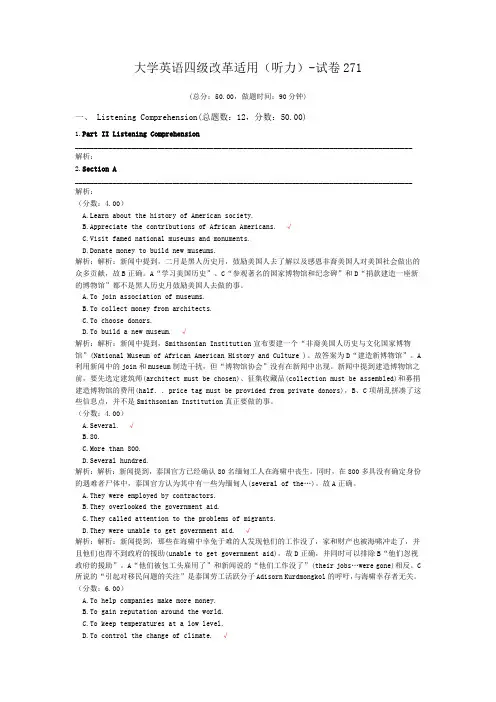
大学英语四级改革适用(听力)-试卷271(总分:50.00,做题时间:90分钟)一、 Listening Comprehension(总题数:12,分数:50.00)1.Part II Listening Comprehension__________________________________________________________________________________________ 解析:2.Section A__________________________________________________________________________________________ 解析:(分数:4.00)A.Learn about the history of American society.B.Appreciate the contributions of African Americans. √C.Visit famed national museums and monuments.D.Donate money to build new museums.解析:解析:新闻中提到,二月是黑人历史月,鼓励美国人去了解以及感恩非裔美国人对美国社会做出的众多贡献,故B正确。
A“学习美国历史”、C“参观著名的国家博物馆和纪念碑”和D“捐款建造一座新的博物馆”都不是黑人历史月鼓励美国人去做的事。
A.To join association of museums.B.To collect money from architects.C.To choose donors.D.To build a new museum. √解析:解析:新闻中提到,Smithsonian Institution宣布要建一个“非裔美国人历史与文化国家博物馆”(National Museum of African American History and Culture )。
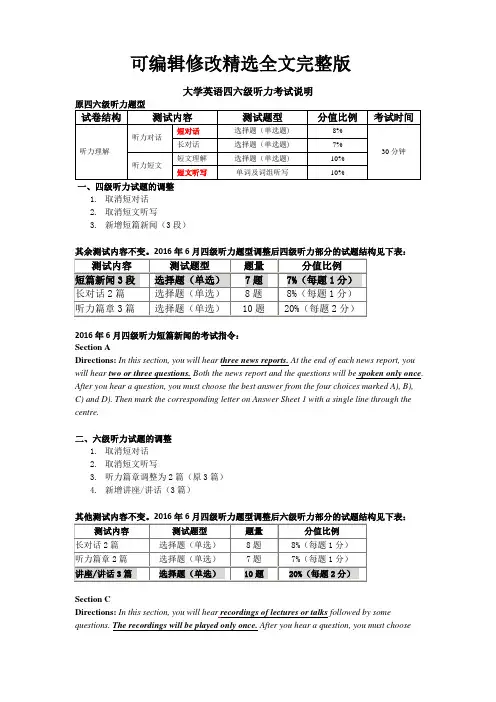
可编辑修改精选全文完整版大学英语四六级听力考试说明一、四级听力试题的调整1.取消短对话2.取消短文听写3.新增短篇新闻(3段)其余测试内容不变。
2016年6月四级听力题型调整后四级听力部分的试题结构见下表:2016年6月四级听力短篇新闻的考试指令:Section ADirections: In this section, you will hear three news reports. At the end of each news report, you will hear two or three questions. Both the news report and the questions will be spoken only once. After you hear a question, you must choose the best answer from the four choices marked A), B), C) and D). Then mark the corresponding letter on Answer Sheet 1 with a single line through the centre.二、六级听力试题的调整1.取消短对话2.取消短文听写3.听力篇章调整为2篇(原3篇)4.新增讲座/讲话(3篇)Section CDirections: In this section, you will hear recordings of lectures or talks followed by some questions. The recordings will be played only once. After you hear a question, you must choosethe best answer from the four choices marked A), B), C) and D). Then mark the corresponding letter on Answer Sheet 1 with a single line through the centre.四级听力样题Questions 1 and 2 will be based on the following news item.Kenyan police say one person was killed and 26 injured in an explosion at a bus station in central Nairobi. The blast hit a bus about to set off for the Ugandan capital Kampala. Last July, the Somali group al-Shabab said it was behind the blasts in the Ugandan capital which killed more than 70 people. Will Ross reports from the Kenyan capital.The explosion happened beside a bus which was about to set off for an overnight journey from Nairobi to the Ugandan capital Kampala. Some eyewitnesses report that a bag was about to be loaded on board, but it exploded during a security check. Windows of the red bus were left smashed, and blood could be seen on the ground beside the vehicle. Just hours earlier, Uganda’s police chief had warned of possible Christmas-time attacks by Somali rebels.1. What is the news report mainly about?2. When did the incident occur?Questions 1 and 2 will be based on the following news item.1.A) Christmas-time attacks made by Somali rebels.B) An explosion at a bus station in central Nairobi.C) The killing of more than 70 Ugandans in Kampala.D) Blasts set off by a Somali gr oup in Uganda’s capital.2.A) On Christmas Eve. C) During a security check.B) Just before midnight. D) In the small hours of the morning.Questions 3 and 4 will be based on the following news item.Woolworths is one of the best known names on the British High Street. It’s been in business nearly a century. Many of its 800 stores are likely to close following the company’s decision to call in administrators after an attempt to sell the business for a token £1 failed.The company has huge debts. The immediate cause for the collapse has been Britain’s slide toward recession, which has cut into consumer spending. However, the business had been in trouble for years.Known for low-priced general goods, Woolworths has struggled in the face of competition from supermarkets expanding beyond groceries and a new generation of internet retailers.Many of the store group’s 25,000 employees are likely to lose their jobs. Some profitable areas such as the DVD publishing business will survive.3. What do we learn about Woolworths from the news report?4. What did Woolworths attempt to do recently?Questions 3 and 4 will be based on the following news item.3. A) It is likely to close many of its stores.B) It is known for the quality of its goods.C) It remains competitive in the recession.D) It will expand its online retail business.4. A) Expand its business beyond groceries.B) Fire 25,000 of its current employees.C) Cut its DVD publishing business.D) Sell the business for one pound.Questions 5 to 7 will be based on the following news item.Cairo is known for its overcrowded roads, irregular driving practices and shaky old vehicles, but also for its air pollution. In recent months, though, environmental studies indicate there have been signs of improvement. That’s due in part to the removal of many of the capital’s old-fashioned black and white taxis. Most of these dated back to the 1960s and 70s and were in a poor state of repair.After new legislation demanded their removal from the roads, a low interest loan scheme was set up with three Egyptian banks so drivers could buy new cars. The government pays about $900 for old ones to be discarded and advertising on the new vehicles helps cover repayments.The idea has proved popular w ith customers ― they can now travel in air-conditioned comfort and because the new cabs are metered, they don’t have to argue over fares. Banks and car manufacturers are glad for the extra business in tough economic times. As for the taxi drivers, most are delighted to be behind the wheel of new cars, although there have been a few complaints about switching from black and white to a plain white colour.5. What change took place in Cairo recently?6. What helped bring about the change?7. Why do customers no longer argue with new cab drivers?Questions 5 to 7 will be based on the following news item.5. A) All taxis began to use meters.B) All taxis got air conditioning.C) Advertisements were allowed on taxis.D) Old taxis were replaced with new cabs.6. A) A low interest loan scheme. C) Taxi passengers’ complaints.B) Environmentalists’ protests. D) Permission for car advertising.7. A) There are no more irregular practices.B) All new cabs provide air-conditioning.C) New cabs are all equipped with meters.D) New legislation protects consumer rights.Section A1. B2. C3. A4. D5. D6. A7. C六级听力样题Now listen to the following recording and answer questions 16 to 19.Moderator (会议主持人):Hello Ladies and Gentleman, it gives me great pleasure to introduce our keynote speaker for today’s session, Dr. Howard Miller. Dr. Miller, Professor of Sociology at Washington Universit y, has written numerous articles and books on the issues facing older Americans in our graying society for the past 15 years. Dr. Miller:Dr. Miller:Thank you for that introduction. Today, I’d like to preface my remarks with a story from my ownlife which I feel highlights the common concerns that bring us here together. Several years ago when my grandparents were well into their eighties, they were faced with the reality of no longer being able to adequately care for themselves. My grandfather spoke of his greatest fear, that of leaving the only home they had known for the past 60 years. Fighting back the tears, he spoke proudly of the fact that he had built their home from the ground up, and that he had pounded every nail and laid every brick in the process. The prospect of having to sell their home and give up their independence, and move into a retirement home was an extremely painful experience for them. It was, in my grandfather’s own words, like having a limb cut off. He exclaimed in a forceful manner that he felt he wasn’t important anymore.For them and some older Americans, their so-called “golden years” are at times not so pleasant, for this period can mean the decline of not only one’s health but the loss of identity and self-worth. In many societies, this self-identity is closely related with our social status, occupation, material possessions, or independence. Furthermore, we often live in societies that value what is “new” or in fashion, and our own usage of words in the English language is often a sign of bad news for older Americans. I mean how would your family react if you came home tonight exclaiming, “Hey, come to the living room and see the OLD black and white TV I brought!” Unfortunately, the word “old” calls to mind i mages of the need to replace or discard.Now, many of the lectures given at this conference have focused on the issues of pension reform, medical care, and the development of public facilities for senior citizens. And while these are vital issues that must be addressed, I’d like to focus my comments on an important issue that will affect the overall success of the other programs mentioned. This has to do with changing our perspectives on what it means to be a part of this group, and finding meaningful roles the elderly can play and should play in our societies.First of all, I’d like to talk about . . .16. What does the introduction say about Dr. Howard Miller’s articles and books?17. What is the greatest fear of Dr. Miller’s grandfather?18. What does Dr. Miller say the “golden years” can often mean?19. What is the focus of Dr. Miller’s speech?Now listen to the following recording and answer questions 16 to 19.16. A) They investigate the retirement homes in America.B) They are on issues facing senior citizens in America.C) They describe the great pleasures of the golden years.D) They are filled with fond memories of his grandparents.17. A) The loss of the ability to take care of himself.B) The feeling of not being important any more.C) Being unable to find a good retirement home.D) Leaving the home he had lived in for 60 years.18. A) The loss of identity and self-worth.B) Fear of being replaced or discarded.C) Freedom from pressure and worldly cares.D) The possession of wealth and high respect.19. A) The urgency of pension reform.B) Medical care for senior citizens.C) Finding meaningful roles for the elderly in society.D) The development of public facilities for senior citizens.Now listen to the following recording and answer questions 20 to 22.20. A) It seriously impacts their physical and mental development.B) It has become a problem affecting global economic growth.C) It is a common problem found in underdeveloped countries.D) It is an issue often overlooked by parents in many countries.21. A) They will live longer. C) They get along well with people.B) They get better pay. D) They develop much higher IQs.22. A) Appropriated funds to promote research of nutrient-rich foods.B) Encouraged breastfeeding for the first six months of a child’s life.C) Recruited volunteers to teach rural people about health and nutrition.D) Targeted hunger-relief programs at pregnant women and young children.Now listen to the following recording and answer questions 20 to 22.The 2010 Global Hunger Index report was released today by the International Food Policy Research Institute (IFPRI). It notes that, in recent years, experts have come to the conclusion that undernourishment between conception and a child’s second birthday can have serious andlong-lasting impacts.Undernourishment during this approximately 1,000-day window can seriously check the growth and development of children and render them more likely to get sick and die than well-fed children. Preventing hunger allows children to develop both physically and mentally.Says IFPRI’s Marie Ruel, “They will be more likely to perform well in school. They will stay in school longer. And then at adulthood, IFPRI has actually demonstrated that children who were better nourished have higher wages, by a pretty large margin, by 46 percent.”Ruel says that means the productivity of a nation’s future generations depends in a large part on the first 1,000 days of life.“This is why we’re all on board in focusing on those thousand days to improve nutrition. After that, the damage is done and is highly irreversible.”The data on nutrition and childhood development has been slowly coming together for decades. But Ruel says scientific consensus alone will not solve the problem.“It’s not enough that nutritionists know you have to intervene then, if we don’t have the politicians on board, and also the...people that implement [programs] in the field.”Ruel says there are encouraging signs that politicians and implementers are beginning to get on board. Many major donors and the United Nations are targeting hunger-relief programs at pregnant women and young children. They focus on improving diets or providing micro-food supplements. They improve access to pre-birth care and encourage exclusive breastfeeding for the first six months of a child’s life.Ruel says in the 1980s Thailand was able to reduce child undernourishment by recruiting a large number of volunteers to travel the countryside teaching about health and nutrition.“They really did very active promotion of diversity in the diet and good eating habits. So they were providing more food to people, but also educating people on how to use them, and also educating people on how to feed their young children.”Ruel says countries may take different approaches to reducing child undernutrition. But she saysnations will not make progress fighting hunger and poverty until they begin to focus on those critical first thousand days.20. What is the experts’ conclusion regarding children’s undernourishment in their earliest days of life?21. What does IFPRI’s Marie Ruel say about well-fed children in their adult life?22. What did Thailand do to reduce child undernourishment in the 1980s?Now listen to the following recording and answer questions 23 to 25.I’d like to look at a vital aspect of e-commerce, and that is the nature of the product or service. There are certain products and services that are very suitable for selling online, and others that simply don’t work.Suitable products generally have a high value-to-weight ratio. Items such as CDs and DVDs are obvious examples. Books, although heavier and so more expensive to post, still have a high enough value-to-weight ratio, as the success of Amazon, which started off selling only books, shows. Laptop computers are another good product for selling online.Digital products, such as software, films and music, can be sold in a purely virtual environment. The goods are paid for by online transactions, and then downloaded onto the buyer’s computer. There are no postage or delivery costs, so prices can be kept low.Many successful virtual companies provide digital services, such as financial transactions, in the case of Paypal, or means of communication, as Skype does. The key to success here is providing an easy-to-use, reliable service. Do this and you can easily become the market leader, as Skype has proved.Products which are potentially embarrassing to buy also do well in the virtual environment. Some of the most profitable e-commerce companies are those selling sex-related products or services. For a similar reason, online gambling is highly popular.Products which are usually considered unsuitable for selling online include those that have a taste or smell component. Food, especially fresh food, falls into this category, along with perfume. Clothes and other items that need to be tried on such as diamond rings and gold necklaces are generally not suited to virtual retailing, and, of course, items with a low value-to-weight ratio. There are exceptions, though. Online grocery shopping has really taken off, with most major supermarkets offering the service. The inconvenience of not being able to see the food you are buying is outweighed by the time saved and convenience of having the goods delivered. Typical users of online supermarkets include the elderly, people who work long hours and those without their own transport.23 What is important to the success of an online store?24. What products are unsuitable for selling online?25. Who are more likely to buy groceries online?Now listen to the following recording and answer questions 23 to 25.23. A) The guaranteed quality of its goods.B) The huge volume of its annual sales.C) The service it provides to its customers.D) The high value-to-weight ratio of its goods.24. A) Those having a taste or smell component.B) Products potentially embarrassing to buy.C) Those that require very careful handling.D) Services involving a personal element.25. A) Those who live in the virtual world.B) Those who have to work long hours.C) Those who are used to online transactions.D) Those who don’t mind paying a little more.Section C16. B 17. D 18. A 19. C 20. A 21. B 22. C 23. D 24. A 25. B。
英语四级听力新题型解析及答题技巧英语四级听力新题型解析及答题技巧从2016年开始,英语四级听力部分题型有了一些改变,针对这种改变我们应该如何有针对性的进行备考,今天我们来讲一讲关于听力部分题型改变之新增题型——短篇新闻类答题技巧。
一、四级听力题型变化自2016年6月考试起,全国大学英语四、六级考试委员会将对四级考试的听力试题作局部调整。
调整的相关内容说明如下:1.取消短对话。
2.取消短文听写。
3.新增短篇新闻(3段),每段设置2—3个小题,共7题,每小题1分,新闻长度130—190词。
4.长对话(2段)由原来的共7题调整为共8题,每小题1分,对话长度不变。
5.短文理解(3段)题型不变,分值由原来的'每小题1分调整为每小题2分。
6.考试时间由原来的35分钟减为25分钟。
二、新闻英语文体特点(一) 新闻报道“六大要素”新闻报道里的“六大要素”即常说的“人物(who)、时间(when)、地点(where)、事件(what)、原因(why)和方式(ho w)”。
在英语短新闻或内容提要中至少包括其中三个要素:who,what和when,这些是新闻报道中最具价值的三要素。
(二) 倒金字塔结构所谓倒金字塔结构,也称为倒叙法,即按新闻事实重要程度由要点到细节逐步扩展,安排全文。
倒金字塔结构把最重要的事实置于全文的第一句中,即新闻导语(the news lead)。
导语告知听众最新鲜、最关心、最重要的事实,如事件(what)、时间(when)、地点(where)、人物(who)以及原因(why)和方式(how)。
新闻导语是对整条新闻内容的高度概括,听懂了导语,也就听懂了新闻的主要内容。
当然,由于新闻报道的侧重点不同,有时新闻导语可能只包含其中的几个要素。
(三) 新闻英语词汇特点1.常用词汇表示特殊含义新闻报道常使用某些常见词汇来表达事实和事件,这些词汇经过长期使用逐渐取得与新闻报道相联系的特殊意义,成为新闻体词语(journalistic words)。
大学英语四级改革适用(听力)-试卷274(总分:50.00,做题时间:90分钟)一、 Listening Comprehension(总题数:12,分数:50.00)1.Part II Listening Comprehension__________________________________________________________________________________________ 解析:2.Section A__________________________________________________________________________________________ 解析:(分数:4.00)A.62.B.64.C.60. √D.Unknown.解析:解析:新闻提到,Sarkozy计划将最低退休年龄上调两年,即上调到62岁,可判断在此之前,最低退休年龄应为60岁,C为答案。
A.The better-off.B.Financial institutions.C.Ordinary people. √ernment.解析:解析:新闻最后提到,反对者认为向金融机构和富人群体征收更高的税款,养老金体系就可以得到维持。
可见反对者是站在一般民众的立场上的,而不是站在富裕人群、金融机构和政府立场上的,C正确。
(分数:4.00)A.Give teachers extra help.B.Engage in many activities.C.Show up in class. √D.Offer constructive advice.解析:解析:新闻开篇部分提到,现在有些美国学校推出一项新举措:奖励成绩有进步的学生,甚至学生仅仅因为到学校上课就可得到奖励。
因此C为答案。
A“给老师额外的帮助”、B“参加许多活动”和D“提供指导性的建议”均没有在新闻中提到。
A.It has nothing to do with higher math score.B.It works in some subjects, but not in others. √C.It leads to higher scores in social studies.D.It encourages students to do better in science.解析:解析:新闻中用了mixed results来概括奖励学生这一举措的有效性,指出它能提高学生的数学成绩,但仅在实施奖励的情况下才有此效果;并且尚无证据表明它能提高学生的阅读、社会科学和理科的成绩,可见它对一些学科有用,但对另一些则无效,因此B正确。
英语四级真题:2024年6月大学英语四级听力原文大学英语四级听力考试是英语水平测试的重要组成部分,考查学生在英语听力方面的实际能力。
2024年6月的大学英语四级听力原文题目及内容如下:Part IDirections: In this part, you will hear 8 short conversations. At the end of each conversation, a question will be asked. Both the conversation and the question will be spoken twice. After each question, you will have 15 seconds to choose the best answer from the four choices marked A, B, C and D.1、M: The concert starts at 7:30. Let's hurry up. W: I'm sorry,I can't go with you. I have to finish this report first. Q: Why can't the woman go to the concert with the man? A. She is not interested in music. B. She has an important meeting to attend.C. She has to finish a report.D. She is sick and tired.2、M: Are you free this Sunday afternoon? W: Yes, why? M: Would you like to go watch a football match? W: Oh, no. I've never been interested in football. Q: What is the woman's attitude towards watching a football match? A. Positive. B. Negative.C. Neutral.D. Indifferent.3、M: What a nice watch! Is it new? W: Yes, my husband bought it for me last month. M: Oh, it's beautiful. But I've never seen him wear a watch. Q: What can we infer from the conversation?A. The man doesn't like watches.B. The woman doesn't know her husband well.C. The woman's husband doesn't wear a watch.D. The man is uninterested in watches.Part IIDirections: In this part, you will hear 2 long conversations. At the end of each conversation, you will hear some questions. Both the conversation and the questions will be spoken twice. After each question, you will have 20 seconds to answer the question.4、M: Hi, Mary, how was your weekend? W: It was great! I went to the beach with my family and had a lot of fun in the sun. M: That sounds nice. What did you do there? W: We played beach volleyball, built sandcastles, and went for swimming in the sea. It was really relaxing and enjoyable. M: Sounds like you had a blast! What did you do on the last day? W: We went to a nice seafood restaurant and had some delicious meals. It was a perfect ending to a wonderful weekend. Q: What did the woman do on the last day of her weekend? A. She played beach volleyball.B. She built sandcastles.C. She went for swimming in the sea.D. She went to a seafood restaurant and had meals.41、M: Hi, Sarah, how was your trip to Europe? W: It was fantastic!I visited several countries and saw many beautiful景点. M: That's great. Which country did you like best? W: Well, I really loved Italy because of its famous art and culture. And I also enjoyed visiting France because of its delicious food and fashion industry. M: Sounds like you had an excellent time! Did you take any photos? W: Yes, I took many photos of the景点and the food. I'll show you some of them when we meet next time. Q: What does the woman say about her trip to Europe?。
大学英语四级改革适用(听力)模拟试卷239(题后含答案及解析)题型有:1. What has caused the increasing demand for chefs in Uganda?2. What can we learn about the Impact Chef’s Academy?1.A.The competition from neighboring countries.B.The slowdown in the Uganda economy.C.The rapid growth in restaurant and tourism industry.D.The serious shortage of skilled executives.正确答案:C解析:新闻中提到,近几年餐厅和旅游业发展相当迅速,因此对训练有素的厨房人员的需求也随之增加了。
2.A.It is the only training school in Uganda.B.Its prospect looks quite good.C.Its staff is hired from Kenya.D.It provides no courses for novices.正确答案:B解析:新闻中提到,现在学院已经尝到了成功的滋味,并且期待将其继续扩大。
听力原文:(3)Los Angeles is about to become the largest American city to raise its minimum wage to $ 15 an hour, an increase to be phased in over five years. The wage is more than twice the current minimum rate required by US law. Some business groups, however, say such increases will cost jobs. Protesters demanding a higher minimum wage have been rallying around the country, from New York to Phoenix.(4)Minimum-wage workers went to Los Angeles City Hall last week as council members considered the wage increase. It was given preliminary approval Wednesday and is expected to pass a final vote June 10. The measure will raise the minimum wage in regular increases starting next year, to reach $ 15 an hour by 2020. Workers for small businesses and nonprofit organizations will reach the $ 15 mark the following year.3. What is the current minimum wage required by US law?4. What happened in Los Angeles City Hall last week?3.A.About $ 7 per hour.B.More than $ 10 per hour.C.About $ 15 per hour.D.Fewer than $ 1 per hour.正确答案:A解析:新闻中提到,在未来五年内,洛杉矶计划逐步把最低工资提高到每小时15美元。
大学四级CET4历年真题听力(附文本)•听力考试概述与技巧•历年真题回顾与解析•听力文本详解与拓展•模拟试题训练与实战演练目•听力备考资源推荐与使用•总结回顾与展望录01听力考试概述与技巧听力考试形式及内容考试形式大学四级CET4听力考试采用录音播放的形式,考生通过耳机听取录音材料并回答问题。
考试内容听力考试通常包括短对话、长对话、短文理解和复合式听写四个部分,涵盖日常生活、学习、工作等各个领域的话题。
题目类型题目类型主要有选择题和填空题两种,其中选择题需要考生从四个选项中选出一个最佳答案,填空题则需要考生根据听到的内容填写缺失的单词或短语。
练习听写针对复合式听写部分,可以通过大量的听写练习来提高听音辨词和拼写能力,同时也有助于提高听力速度和准确性。
预读选项在听录音材料前,快速浏览题目选项,预测可能的问题和答案,有助于在听的过程中迅速定位关键信息。
注意关键词在听的过程中,注意捕捉与问题相关的关键词,如人名、地名、数字、时间等,这些关键词往往对理解录音内容和回答问题至关重要。
速记要点对于长对话和短文理解部分,可以适当地做一些速记,如记下关键信息、重要细节和逻辑关系,有助于在听完录音后准确地回答问题。
听力技巧与策略0102制定计划制定合理的备考计划,明确每天或每周的听力练习时间和内容,保持持续的学习和进步。
精听与泛听结合精听是指对听力材料进行深入的分析和理解,泛听则是通过大量的听力输入来提高语感和对语言的熟悉度。
备考时应结合精听和泛听两种方法,既注重细节又培养语感。
模拟考试在备考过程中,定期进行模拟考试是非常重要的。
模拟考试可以帮助考生熟悉考试流程和时间管理,同时也能让考生对自己的备考进度有一个清晰的认识。
积累词汇和短语扩大词汇量,熟悉常用的短语和表达方式,有助于更好地理解听力材料中的信息。
可以通过阅读、听力练习和记忆单词等方式来积累词汇和短语。
注意听力速度在备考过程中,要注意提高自己的听力速度。
可以通过听一些速度较快的英语材料来逐渐适应和提高自己的听力速度。
大学英语四级改革适用(听力)-试卷269(总分:50.00,做题时间:90分钟)一、 Listening Comprehension(总题数:12,分数:50.00)1.Part II Listening Comprehension__________________________________________________________________________________________ 解析:2.Section A__________________________________________________________________________________________ 解析:(分数:4.00)A.Their health becomes worse.B.They don't fight as hard as before.C.They won't get the benefit of pension. √D.They receive less education.解析:解析:新闻提到,下一代的退休人员失去了一项退休福利(won't have a retirement benefit),这项“福利计划”(defined-benefit plan)也就是“养老金”(pension),C“他们得不到养老金的福利”与新闻内容相符。
新闻中有提到这批退休人员将是美国有史以来最健康、教育程度最高、最富有的,据此可排除A、D。
B利用新闻中的fought hard作干扰,新闻是说这个pension的制度是上一辈人努力争取出来的结果,并没有说“下一代退休人员不努力”。
A.In the late 1970s. √B.In the early 1970s.C.During World War Ⅱ.D.In the late 1960s.解析:解析:新闻提到,养老金制度在第二次世界大战时开始流行,到了20世纪70年代末达到流行高峰(reached the height of their popularity in the late 1970s。
1.There are five basic functions of a newspaper: to inform, toreview, to persuade, to instruct and to entertain. You may think that this list of functions is in order of 26importance . But, if so, you would not be 27 in agreement with the majority of the reading public.Of the two 28 category of newspaper, the popular and the quality, the former have a readership of millions, while the 29 letter , only hundreds of thousands. Yet the popular papers seem largely 30 designed recreation and light- hearted human interest stories. Their news coverage contains lots of comments and 31 persuade language: the information content is low, and instruction is minor. However, the quality newspapers put a much lower emphasis on 32 entertainment . It is not only in content that the two types of paper differ. There is a difference, too, in the style in which the articles are written.The popular papers 33 generally use more dramatic language with a lot of wordplay. This means that popular newspapers are easier for a native speaker to understand. In order to decide whether a newspaper is a quality or a popular one, it is not even 34 necessary to read it, since you can tell simply by the way it looks.Popular papers are generally smaller with fewer columns per page than quality ones. They have bigger headlines and more photographs. There is a greater variety of typeface and printed symbols. Such devices are not only used to make the paper more 35 attractive ; they may also influence what the reader reads. Larger headlines, pictures and positions on the page all serve to draw the reader’s attention.2.It has been proven that short bursts of concentration repeatedfrequently are much more 26 effective than one long period. So, even if you only have 10 minutes, DO IT. Take a break. Then study another 10 minutes. This 27 approach is highly efficient because it honors the way the brain likes to work. The brain needs 28 recovering and recharging time. The rest periods are a powerful tool which many teachers do not 29 acknowledge 承认. To sit and study for hours and hours is not only 30 boring , it also creates fatigue and stress. You cannot learn if you are fatigued and stressed. Do not study if you are tired, angry, 31 distractive , or in a hurry. When the brain is relaxed, it naturally absorb data like a sponge 32 without efforts . If you are emotionally stressed, yourbrain 33literally 逐字的、照字面的refuses data.Forcing yourself to sit and study when your mind is on other things is a complete waste of time. When you learn something new, try to go over the points the same day. If you wait some days and then 34 make effects to review the material, the things you have learned will seem much less familiar. If you 35 requited certain in your environment to help you study, try to always make these a priority. Pay attention to what works for you and repeat it each time you study for best succes3.Modern mass-production methods lower the cost of makinggoods, and thus give us better values. At the same time, American ingenuity and science are constantly at work 26improve of products. In this way, better quality products at good 27 values are continually being brought to the people of all 28 income groups. As an example of how this works, when facial tissues were first put on the market in ?9?4, they were made in 29 limited quantities and sold at 65 cents per box of 200. People liked these facial tissues immediately and began asking for them when they went into different stores. Because there was sucha 30 demand for the product, manufacturers beganmaking tissues in larger and larger quantities. Because the makers were making tissues 31 great quantities their production costs were lowered so that the cost of tissues went down. In the meanwhile, the quality of facial tissues was 32constantly improving, because more manufacturers went into the business of making tissues, and each manufacturer 33 his product better than his competitor’s. Today, 34instead of 65 cents, a box of 200 facial tissues’ costs around one-third of that price, and they are both softer and stronger. When people are free to compete and are free to make more things and make them better — everyone 35 benefits .4. Thanksgiving is an autumn harvest festival like those found in many cultures. Today the holiday is a time of family 26 reunions , parades and watching football games on television. And, oh yes, food. For millions of Americans, Thanksgiving is a day 27 spend cooking, eating and talking. Thanksgiving is what the 28 social scientists call a civil holiday. It is not religious but it does 29 has spiritual meaning . For some families,Thanksgiving may be the only time of year when everyone gets together. The government says the Sunday after Thanksgiving is the busiest day of the year for 30 long distance travel as people return from gatherings.Thanksgiving memories are often made of the big Thanksgiving Day meal. Some families serve ham. Others serve a 31midst dinner. But the traditional main dish is turkey. Most people cook the bird in an oven; some prepare it other ways, like fried in oil. Turkey on Thanksgiving is usually served with a bread mixture inside. Some Americans call it stuffing; others call it dressing. Popular side dishes on Thanksgiving include sweet potatoes and green beans. Then for a rich, sweet dessert there is often pumpkin pie. Many Thanksgiving tables also 32are heavy with Other courses, often brought by guests. And if the guests eat all that is served, they too will feel 33 happy . For people who do not have much food or a home to go to at Thanksgiving, 34 several groups play an important part. To help the 35 lady , religious and service organizations throughout the country serve special Thanksgiving meals.5. United Nations talks on climate change have ended inBangkok with little sign of progress. There are still major 26disagreement between developing and rich countries, 27 high leading concerns about whether an agreement can be reached. U. N. officials say two weeks of talks on climate change 28 ended with modest progress, mainly on technical issues. But major gaps remain between rich and developing nations on how to reduce global greenhouse gas emissions. Developing nations want rich countries to 29 commit to higher emission reductions and provide them more funding to reduce their own emissions. Norway and Japan were the only industrialized countries to win applause for 30 ensuring further emission reductions. Bernarditas Muller is an 31 environment affairs advisor for the Philippines and spoke for the group of 77 developing nations and China. She said rich country funding offers were fortunately 32 inadan . “The proposals that we have on the table before us for financing, for technology transfer, for adaptation, all of which are 33ligerly binding-commitments, only go towards shirking and skirting these responsibilities, shifting these responsibilities to developing countries themselves,” she said.Industrialized countries say they hope to see more commitmentsfrom developing nations on emission reductions. Rights groups expressed concern that the difference between rich and developing nations is expanding. But Yvo de Boer, the U.N.’s top climate change official, says there have been significant advances in the process and that there is still an underlying spirit of being constructive. “All the ingredients for success are 34on the table . And, what we must do now is to 35back self- interest and let common in terest prevail,” he said.6. Teaching today demands more than just caring about children and knowing one’s subject well. Teachers need to find out what 26move the learners, how to find the students’ strengths and 27 weakness , and how to create environments in which they 28thrive茁长成长. This leads us to the need of learning about the theories and methods of teaching. A recent report 29 concluded that universities have too often failed, and continue to fall; their undergraduate students are graduating without some of the basic skills they need to function in the 30professional world, such as knowing how to think 31 largely , write clearly, or speak fluently. The report challenges universities to rethink their 32traditional instruction models.Everyone involved in the teaching- learning 33 experience should recognize that they are both discoverers of knowledge and learners. Considering the fast pace of global academic progress, it seems that the time has come when the skills of analysis and evaluation become the symbol of a good education. Teaching prepares our students to be critical thinkers and reflective learners. It should be stressed at all levels and opportunities should be provided so that those who aspire to adopt this profession should come toward it with full enthusiasm. The next stage in the process is to 34get together for learning about the importance of professionalism in teaching. With the new governmental setup taking place, democracy beginning to dig roots and participation becoming the base of life, let us set ourselves to the challenging task of bringing glory to the nation by 35 suicui of the youth of this country through our educational system.。